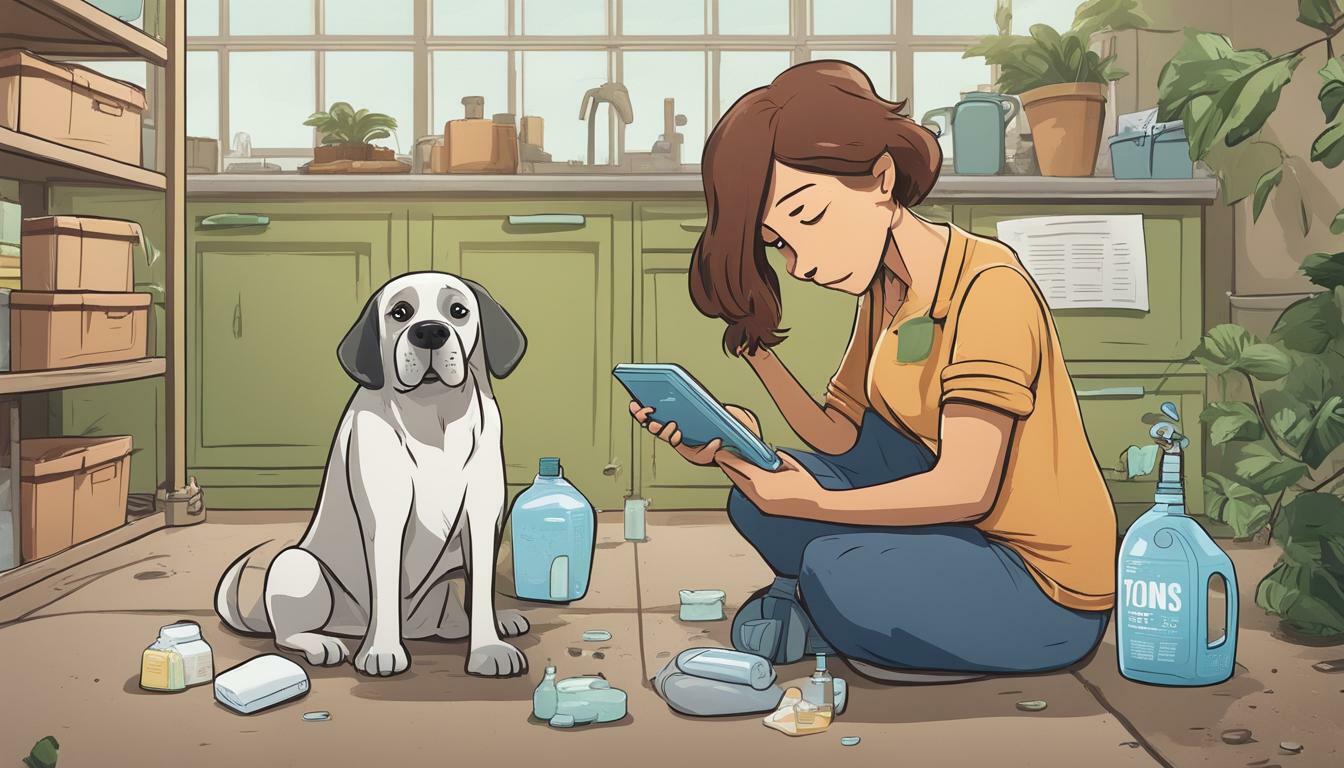
As pet owners, we want to provide our dogs with the best possible care. Unfortunately, exposure to pesticides is a common occurrence that can lead to numerous health issues for our furry friends. Pesticides are often used in gardens, public parks, and even in our own homes. These harmful chemicals can cause a wide range of symptoms in dogs, including vomiting, diarrhea, lethargy, and even seizures.
It is crucial to detox your dog from pesticides to ensure their overall health and well-being. In this section, I will discuss the importance of detoxing your dog from pesticides, the potential harm these chemicals can cause, and steps for detoxing your dog naturally.
Key Takeaways:
- Toxins from pesticides can cause harm to your dog’s health.
- Detoxification of harmful chemicals is necessary for your dog’s overall well-being.
- Detoxing your dog naturally can be done through various remedies and supplements.
Understanding the Effects of Pesticides on Dogs
As a dog owner, it is important to understand the potential risks associated with pesticide exposure. Pesticides are chemicals used to control pests, and they can be found in various forms, including sprays, dusts, and baits. If your dog comes into contact with pesticides, they can experience harmful effects on their health.
The health risks associated with pesticide exposure in dogs can range from mild to severe. Common symptoms of pesticide exposure in dogs include vomiting, diarrhea, lethargy, loss of appetite, and seizures. However, more severe symptoms can include respiratory distress, organ damage, and even death.
If you suspect your dog has been exposed to pesticides, it is essential to seek veterinary care immediately. Your veterinarian can assess your dog’s symptoms and develop a treatment plan to minimize the potential damage to their health. Additionally, they can provide you with information on how to prevent future pesticide exposure.
Steps for Detoxing Your Dog from Pesticides
Detoxifying your dog from pesticides is a multi-step process that requires patience and consistency. Here are the steps you should follow to ensure your dog’s body rids itself of harmful toxins:
Step 1: Natural Remedies
One of the best ways to detoxify your dog is by using natural remedies. These substances can help your dog’s liver and kidneys eliminate toxins more efficiently. Some of the most effective natural remedies for detoxification include milk thistle, dandelion, and burdock root. You can add these herbs to your dog’s food or give them in supplement form.
Step 2: Diet Changes
Diet plays a crucial role in the detoxification process. Make sure your dog’s daily meals consist of high-quality, whole foods free from preservatives, artificial colors, and flavors. Fresh vegetables, lean meats, and healthy fats are excellent choices that can help your dog’s body rid itself of toxins.
Step 3: Supplements
Supplements can help enhance your dog’s detoxification process. Probiotics, digestive enzymes, and fish oil can support your dog’s immune system and improve nutrient absorption. Additionally, bentonite clay or activated charcoal can help bind toxins in the gut and eliminate them from the body.
Step 4: Providing Clean Water
Toxins can accumulate in your dog’s body through drinking contaminated water. It’s crucial to provide your dog with clean, filtered water to help support their detoxification process. Consider investing in a high-quality water filter that can remove impurities and harmful chemicals from your dog’s drinking water.
By following these detoxification steps and providing your furry friend with natural remedies, a healthy diet, and clean water, you can help your dog’s body eliminate harmful toxins, and restore their health.
Preventing Future Pesticide Exposure
While it’s important to detox your dog from pesticides, preventing future exposure is equally crucial. Here are some steps you can take to minimize the risk of pesticide exposure:
- Switch to organic yard care products, such as compost and natural fertilizers, to avoid chemical pesticides and insecticides.
- Use toxin-free products for cleaning your house and washing your dog’s bedding and toys.
- Consider alternative pest control methods, such as using traps or essential oils, instead of chemical-based sprays.
- Practice safe handling of pesticides and avoid using them in areas where your dog spends time.
By following these preventive measures, you can ensure a pesticide-free environment for your dog and reduce the risk of pesticide exposure. Remember that the use of pesticides not only harms your dog but also the environment and other animals around you.
Conclusion
In conclusion, keeping our dog’s health in check is an essential aspect of responsible pet care. Detoxing our dogs from pesticides is a necessary step towards ensuring they live pesticide-free lives, free from harmful toxins and chemicals. By following the steps outlined in this article and taking preventive measures to minimize their exposure to pesticides, we can keep our furry friends healthy and happy for years to come.
Remember, the health of our pets is in our hands. It’s our responsibility to provide them with a safe and healthy environment, and this includes keeping them away from harmful pesticides. With proper care, we can ensure our dogs live pesticide-free lives and enjoy a healthy and vibrant existence. Let’s make a conscious effort to prioritize our dog’s health and well-being, and strive towards pesticide-free living for our beloved companions.
FAQ
Q: How often should I detox my dog from pesticides?
A: The frequency of detoxing your dog from pesticides depends on their level of exposure and individual health. It is generally recommended to detox your dog at least once a year or as advised by your veterinarian.
Q: Can I use home remedies for detoxing my dog?
A: Yes, there are several natural remedies that can help with detoxification, such as milk thistle, dandelion root, and activated charcoal. However, it is important to consult with your veterinarian before administering any home remedies to ensure they are safe and appropriate for your dog.
Q: How long does the detoxification process take?
A: The duration of the detoxification process can vary depending on the severity of pesticide exposure and your dog’s overall health. It may take several weeks to months for the body to eliminate toxins fully. Patience and consistency are key during the detoxification process.
Q: Can I use commercial detox products for my dog?
A: There are commercial detox products available for dogs, but it is essential to research and choose products with high-quality ingredients and trusted brands. Always consult with your veterinarian before using any commercial detox products to ensure they are suitable for your dog.
Q: How can I prevent future pesticide exposure for my dog?
A: To prevent future pesticide exposure, consider using organic yard care practices, opting for toxin-free products, and exploring alternative methods for pest control. It is also important to educate yourself on safe practices and avoid areas where pesticides have been recently applied.
- Does Flea Treatment Kill Lice? - September 8, 2023
- Does Flea Treatment Kill Mites? - September 8, 2023
- How to Put Flea Treatment on a Dog? - September 8, 2023






